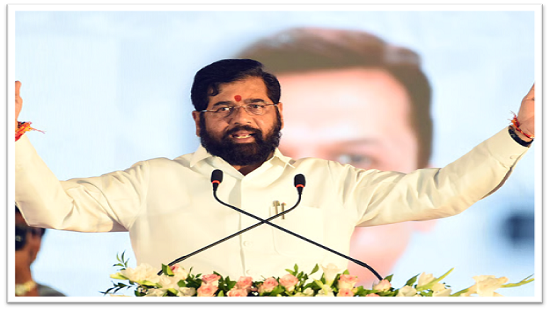
Eknath Shinde Leverages Diwali Bonus to Strengthen Civic Connect Ahead of Maharashtra Polls
As Maharashtra’s political landscape readies itself for upcoming civic polls, the festive season has acquired a distinctly strategic tone. Deputy Chief Minister Eknath Shinde, who also heads the state’s Urban Development Department, has announced Diwali bonuses for municipal employees across Mumbai, Thane, and Navi Mumbai — a move that resonates far beyond financial generosity. While the annual ex-gratia payment to civic workers is a routine practice, this year’s announcement carries a symbolic charge. By taking personal ownership of the declaration, Shinde has positioned himself as both a benefactor of civic workers and a champion of municipal welfare, blending governance with subtle political signaling.
The Diwali ex-gratia package extends to thousands of employees across multiple city corporations. In Mumbai, under the Brihanmumbai Municipal Corporation (BMC), the bonus has been fixed at ₹31,000 per employee, covering officers, staff, and educators. Employees of the Thane Municipal Corporation (TMC) will receive ₹24,500 each, while those in the Navi Mumbai Municipal Corporation (NMMC) stand to gain up to ₹34,500. The grants, officially sanctioned through coordination with the respective municipal commissioners, aim to bring financial relief and festive cheer to families that form the backbone of urban governance.
Centralized Announcement Reflects Political Calculus
This year’s approach differs from earlier traditions. Typically, individual municipal corporations issue their own circulars announcing ex-gratia payments. However, in 2025, the announcement came directly from Shinde’s office, underscoring a more centralized, high-visibility rollout. According to the official release, Shinde personally called the commissioners of Mumbai, Navi Mumbai, and Thane, instructing them to expedite the bonus announcement ahead of Diwali. The timing of this decision — coming just months before elections — naturally invites political interpretation. Yet, it also highlights an administrative continuity where civic employees remain integral to both governance and citizen trust.
Festive Recognition for Mumbai’s Civic Workforce
Mumbai’s civic employees, who have kept the metropolis functioning through floods, pandemics, and relentless urban demands, will once again receive ₹31,000 each as an ex-gratia payment. The bonus extends to a wide array of beneficiaries: officers and employees of the Brihanmumbai Electric Supply and Transport (BEST) Undertaking, teachers and non-teaching staff of aided private primary and secondary schools, lecturers, and education assistants in both aided and unaided teachers’ training colleges. Community health volunteers, whose outreach forms the first line of Mumbai’s public health network, will receive a special Bhaubij gift of ₹14,000, while Balwadi teachers — vital to the city’s early education system — will receive ₹5,000.
Incremental Increases Across Thane and Navi Mumbai
In Thane, the bonus has been marginally increased to ₹24,500 from ₹24,000 last year, signaling the administration’s recognition of inflationary pressures and cost-of-living changes. Navi Mumbai, one of Maharashtra’s most efficiently managed civic bodies, has announced a higher cap of ₹34,500 for its employees, reinforcing its reputation for proactive municipal welfare. Meanwhile, other urban local bodies have followed suit. Ulhasnagar Municipal Commissioner Manisha Awhale announced an ex-gratia of ₹18,000, Bhiwandi Nizampur Municipal Commissioner Anmol Sagar declared ₹14,500, and Kalyan Dombivli Municipal Commissioner Abhinav Goel confirmed ₹20,000. Together, these announcements create a mosaic of municipal appreciation that extends across the Mumbai Metropolitan Region (MMR).
Political Stakes and Symbolism Behind the Move
The broader context of this initiative cannot be ignored. The civic polls — particularly in Mumbai — carry enormous political significance. The Brihanmumbai Municipal Corporation, Asia’s richest civic body, was ruled by the undivided Shiv Sena for over two decades until 2022. Since then, an administrator has been managing the BMC due to delayed elections. Both the BJP and the Shinde-led Shiv Sena are determined to regain control of the corporation, which commands not just political symbolism but also vast urban influence. By ensuring that bonuses and festive welfare reach employees efficiently and ahead of schedule, Shinde’s administration is sending a message of operational readiness, fiscal discipline, and grassroots sensitivity — qualities that resonate with voters in urban constituencies.
Criticism from Opposition Voices
Criticism, however, was not absent. Shiv Sena (UBT) MP Sanjay Raut welcomed the bonuses but questioned the political undertone of the announcement, stating that while employees deserve their due, the gesture should not be politicized. His comment — “Shinde must not use this for his political gains. He is not paying the civic staff from his pocket” — reflects the competitive climate that now defines Maharashtra’s political discourse. Nonetheless, beyond partisan narratives, the move underscores an undeniable reality: the welfare of civic employees remains a crucial part of the state’s governance model, irrespective of who claims credit.
Administrative and Economic Perspective
Viewed through an administrative lens, the Diwali bonuses represent a continuation of Maharashtra’s long-standing tradition of recognizing public sector service during festive seasons. They ensure liquidity flow during a period of high consumption, indirectly stimulating local markets and small businesses. Civic workers often represent the middle and lower-middle-income segments whose spending during Diwali supports local retail and services. Thus, beyond the immediate optics, such measures reinforce the social contract between the state and its employees, ensuring both economic circulation and civic morale.
Governance Through Gratitude
For Shinde, this announcement may serve a dual purpose — a nod to tradition and an assertion of leadership. As Maharashtra’s cities grow and governance becomes more complex, symbolic acts of recognition can often define the tenor of public confidence. By tying governance to gratitude during a season of light and renewal, Shinde’s administration has added a layer of human connection to the otherwise procedural rhythm of bureaucracy. In a year of political recalibration, that connection could prove just as valuable as any campaign speech.





